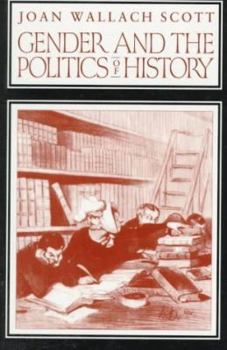Gender and the Politics of History
(Part of the Gender and Culture Series Series)
Select Format
Select Condition 
Book Overview
A self-critical intellectual autobiography, the nine essays in Gender in the Politics of History are a tour de force-they reveal historical imagination relentlessly moving forward...
Format:Paperback
Language:English
ISBN:0231065558
ISBN13:9780231065559
Release Date:January 1989
Publisher:Columbia University Press
Length:242 Pages
Weight:0.80 lbs.
Dimensions:0.6" x 5.8" x 9.0"
Customer Reviews
1 rating
Foundational Work in Gender History
Published by Thriftbooks.com User , 23 years ago
Joan Scott's "Gender and the Politics of History" is one of the landmark books in the field of gender history. What is gender history, you ask? To a large degree, that's a question this book is trying to answer. This book can be regarded as an explanation of *what* gender history is (as Scott defines it, at any rate), why it's important, and how it can be done.Essentially, the book is a set of collected essays organized around the idea of "gender and the politics of history". The first few essays are polemical/theoretical-- and in them, Scott puts forth her argument as to what gender is and why it's an important category of historical analysis. In many ways, these are the most important essays in this volume-- and I *highly* recommend them as a primer to folks who are interested in learning more about why historians are now talking about "gender". In a nutshell, Scott argues that that one of the most fundamenal ways in which people, in all times and plaes, have organized their intellectual/cultural/political world has been through the use of gender-- and that historians should treat gender as a fundamental category of historical analysis-- along with class, nationality, etc. In making this argument, Scott carefully distinguishes between what she calls "gender" (i.e. by which she means the network of arbitrary and socially constructed meanings, ideas, and assumptions that are attributed to masculinity and feminity *and* the way in which these meanings are deployed in everyday life and discourse) and mere "sex" (mere biological/anatomical distinction between men and women). This is subtle point, but it's an essential one-- and it has many important implications for Scott's view of gender history. Of especial note, it means that she understands writing about the history of gender to be a specific kind of intellectual/cultural history-- she is *not* talking about merely writing the social history of women. For her, gender is an idea that gets used in discourse because it involves very basic, and highly value-laden assumptions-- and the task of the gender historian is to understand *how* and *why* it has been used and changed. Scott thus sharply distinguishes what she would call "gender history" from the so-called "women's history" that was pioneered back in the 70s (whose main emphasis was to recount how women had been dominated and abused in the past and to correct the errors of previous historians who had ignored the contributions and experiences of women). The remainder of the essays fall into three groups. One pair of essays are historiographical-- they are methodological critiques of two of the most seminal works on English labor history: E.P. Thompson's "The Making of the English Working Class" and Gareth Stedman Jones' "Languages of Class". Though Scott recognizes-- and lauds-- the contributions of both of these works, she also notes that they ignore the role that notions of gender played in the formation of working class identi





